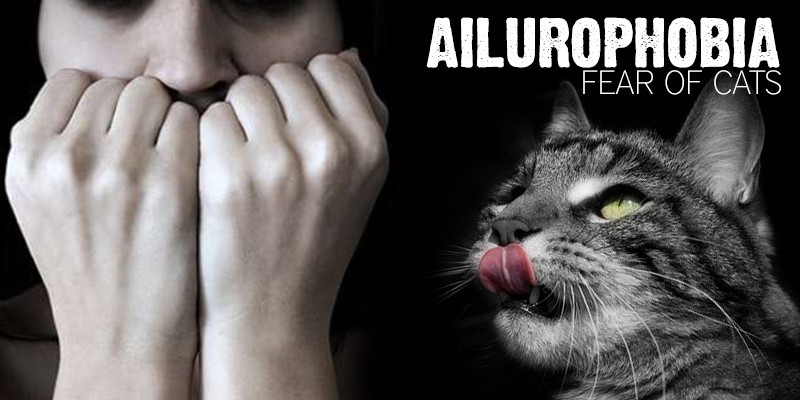Many people love cats, and there are those that don’t like them at all. Then, there’s this group of people who dread these little creatures. Any such intense and irrational aversion to cats is known Ailurophobia.
The word Ailurophobia has been derived from Greek word “ailouros” which means cats. Ailurophobia, also known as gatophobia, is signified by intense dread of cats with no reasonable explanation. Almost all the times, the cats do not pose a real risk at all. Most of the people having Ailurophobia are scared to get bitten or scratched by cats. This is very much common in people, especially people having zoophobia. In fact, 22.2 percent of people of U.S are estimated to be going through Ailurophobia.

What Causes Ailurophobia?
A combination of factors can be responsible for Ailurophobia in people.
A traumatic Event
A major cause for Ailurophobia in people is mostly due to a traumatic event associated with a bitter experience with cats. A person is likely to have Ailurophobia if he/she has encountered getting bitten from a cat, or getting attacked at some point in their lives. The phobia can also be caused by witnessing someone else or a loved one go through a hurtful incidence with cats. It has also been seen that watching TV and internet flicks showing cat attacks may cause people become phobic of cats.
Superstitions and beliefs
There are many superstitions and beliefs associated with cats, and many people really believe them. Beliefs like a black crossing a road is sign of bad luck or cats represent witches can imply that cats are actually dreadful animals. People engrossed in these types of superstitions can have Ailurophobia.
The Symptoms of Ailurophobia
Common symptoms that signify Ailurophobia in people (both children and adults) are:
- Extreme and irrational fear and apprehension of cats ( the fear can be triggered by a thought or a picture of a cat)
- Flight or fight response i.e. either fleeing away immediately or trying to fend off the cat
- Complete avoidance of places where cats are found such as friend or neighbor having cat as a pet
- Screaming or crying out upon the first sight of a cat
- Realizing that the fear is irrelevant (except in children)
- Extensive alertness that one might find a cat and showing behavior like carrying cat’s food or pepper spray due to the fear of getting attacked
- Compulsorily needing someone to accompany while going out of house due to the fear of encountering cats
- Panic attacks with signs such as shaking, breathing profusely, sweating and clammy hands, racing heartbeat, abdominal uneasiness, dizziness or fainting, nausea and vomiting
When to Visit a Doctor?
If your family or your friend has a pet cat, and you need to get meet them regularly, having Ailurophobia can be distressing. If the above symptoms have been persistent for over a time period of six months, and disrupted your daily life due to similar situations, you need to consult a doctor. Moreover, the phobia can be problematic if you need to encounter these cats every now and then.
How Is Ailurophobia Treated?
A combination of psychotherapies and medications can help with eliminating the symptoms of this phobia. They are:
Exposure Therapy with Relaxation
Exposure therapy can be a very effective psychotherapy for treating Ailurophobia. The therapist guides the person through regular exposures involving cats. It can be a setting with real cat, a toy cat or any picture or movie. The therapist studies how and why the person actually gets fearful of the cats. The major aim is to teach different relaxing ways including breathing control and mental visualizations, and making the person use them during the exposure sessions. As the person gets habituated with the settings having cats, he/she can bring the fear under control.
Cognitive Behavioral Therapy (CBT)
CBT is a therapy which is focused on modifying negative thoughts and behavior of a person. The therapist counsels the person, and helps him/her share how the phobia was developed. This psychotherapy helps to replace the negative thoughts one has towards cats, with positive ones. The counseling sessions also help to release the stress and strain one has been having due to the phobia.
Medications
Medications can be used in severe cases of a person having panic attacks. Anti-anxiety and anti- depressant drugs are commonly used to bring the temperament of a person under control during such phobic episodes.